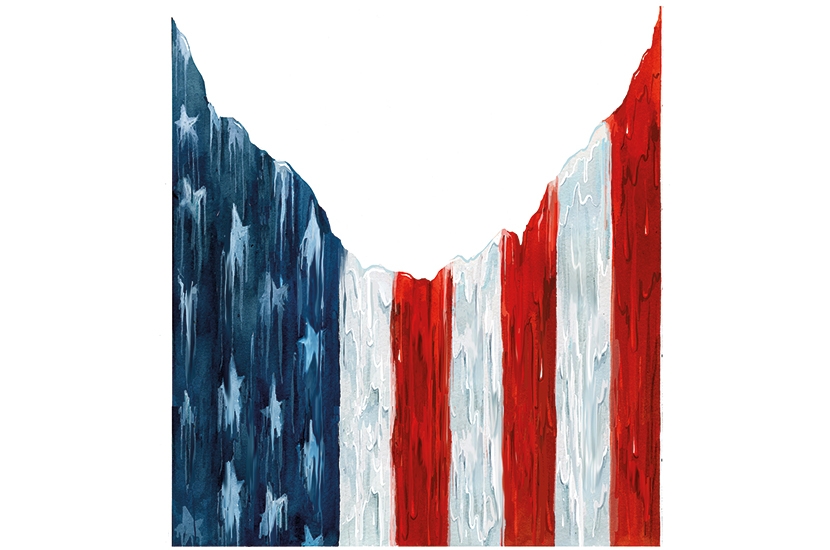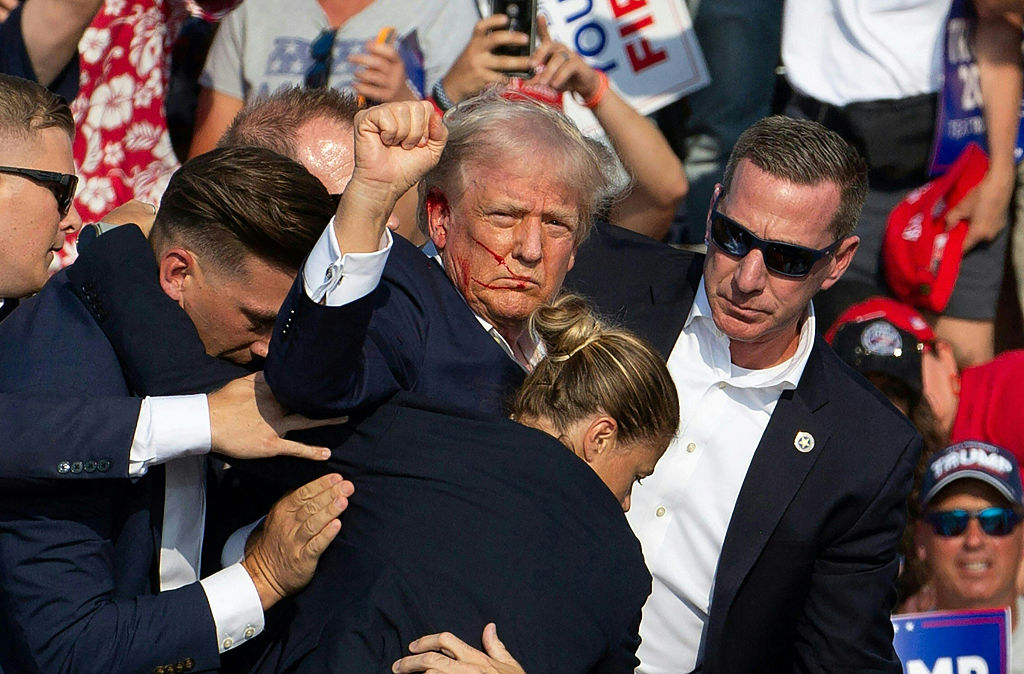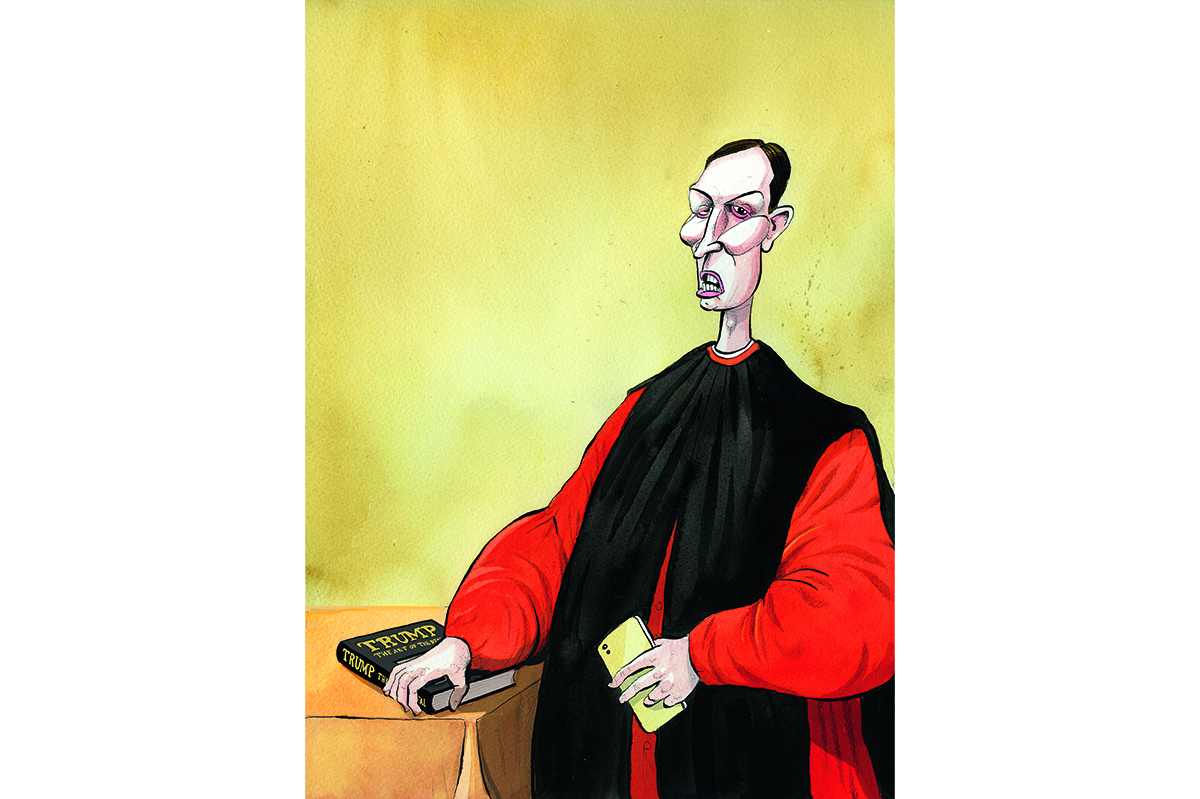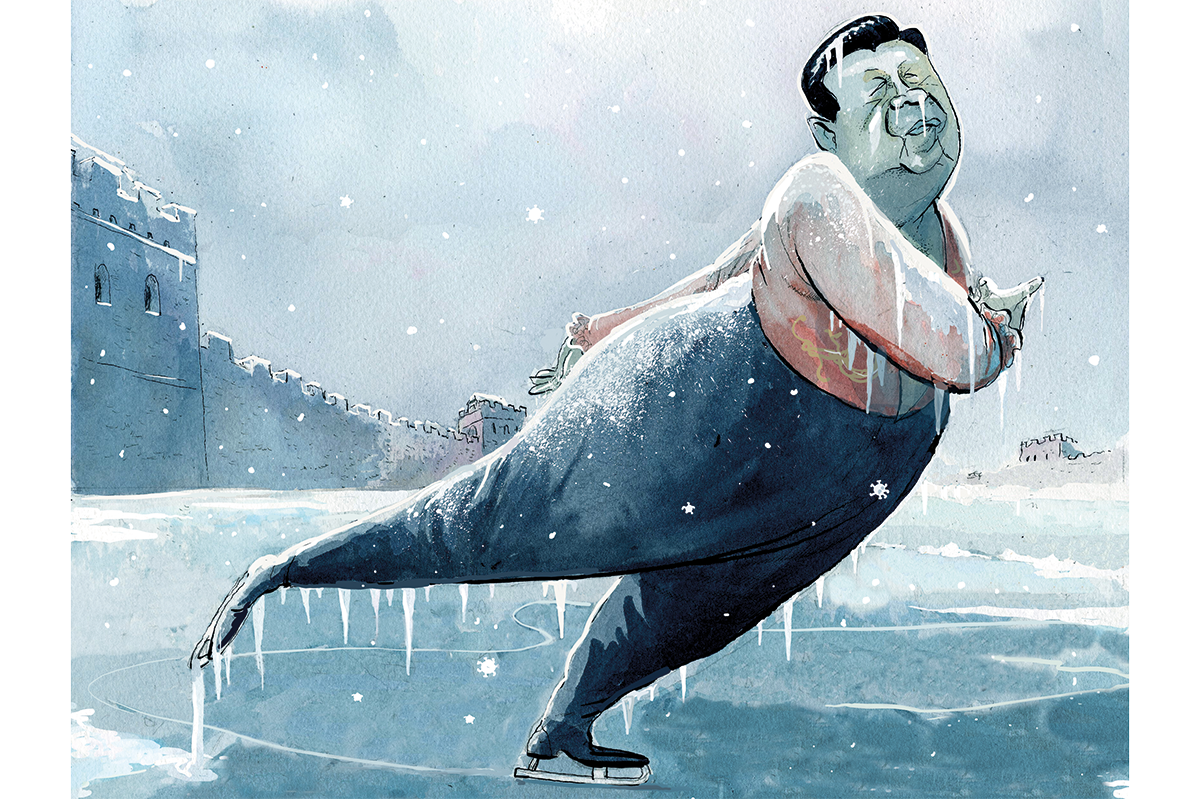Tuesday night’s debate between President Donald Trump and Joe Biden was a hopeless mess — a national embarrassment. For 90 minutes, two cantankerous and incoherent old men ignored the rules, shouted over each other and ruined the event. Trump insulted Biden’s intelligence and his children. Biden told Trump to ‘shut up’ and called him ‘a clown’.
The debate may prove useful in one sense, however — as a foretaste of the democratic meltdown that is coming America’s way after the election on November 3. Again, the rules of the contest will not be accepted, each side will accuse the other of cheating and the whole occasion will turn into a disastrous farce.
If you think that’s hyperbole, just listen to what our would-be leadership has been saying. A few weeks ago — centuries in 2020 time — Hillary Clinton offered an extraordinary piece of advice to her successor. ‘Joe Biden should not concede under any circumstances,’ she said. ‘I think this is going to drag out, and eventually I do believe he will win — if we don’t give an inch and if we are as focused and relentless as the other side is.’ She was referring not just to the election, but what could come after. Her scenario: election night is inconclusive, as postal votes flood in, and with them a debate about their legitimacy. It’s a debate she wants the Democrats to win. ‘We’ve got to have a massive legal operation,’ she said, ‘I know the Biden campaign is working on that.’
For his part, Donald Trump is also gearing up for this fight — and might sue his way back to the White House. ‘We have to be very careful with the ballots,’ he said. ‘That’s a whole big scam.’ A couple of weeks ago, he went even further, questioning not just the election’s legitimacy, but whether there would be a peaceful transfer of power afterwards. He reiterated that point in the debate, saying of the election: ‘This is going to be a fraud like you’ve never seen. This is not going to end well.’
Welcome to America in our annus horribilis. This brutal year has seen a pandemic lock us down, unrest ravage our streets, culture wars that seem intractable — and now the chilling possibility of an Election Day that leads to more chaos.
The big problem centers on the 80 million Americans who are expected to vote by mail this year, more than twice as many as last time, amid fears that polling stations could become coronavirus hotspots. Yet because such a deluge of postmarked ballots is unprecedented and thus untested, concerns have been raised as to how accurate the count will be.
Trump himself has warned of mail-in voting fraud. He’s pointed as evidence to New York’s primary elections on June 23, which featured an unusually high number of postmarked ballots due to the state’s status as a COVID epicenter. The results there were disquieting: weeks passed without winners being declared, and thousands of votes were believed to have been wrongly discarded.
What happened in New York has raised questions about the government’s ability to count mail-in votes accurately and expeditiously. Throw in a confusing patchwork of state-level rules, along with recent cuts to the US postal service, and you can almost hear the challenges issuing forth, the candidates digging in their heels.
What happens if the election results are contested? The answer is that Americans will turn to one of their most cherished pastimes: not guns (not yet anyway) but lawsuits. Biden has said that his campaign has ‘put together 600 lawyers’ and a team of volunteers, who will go ‘into every single state to try to figure out whether chicanery is likely to take place’. The GOP has thousands of volunteer attorneys, and the chief counsel at the Republican National Committee has pledged to ‘spend whatever it takes to make sure the election is conducted orderly and that we push back on the Democrats’ litigation’. Already more than 300 lawsuits have been filed, most of them related to pandemic voting rules and mail-in ballots.
This has left America for the first time in a long time confronting an awful question: what happens if days, weeks, months elapse after Election Day without a clear winner? What happens if both candidates go to court and refuse to concede?
Tune in to American politics these days and you’ll inevitably hear the election described as ‘the most important of our lives’. Children running for middle-school student council claim as much; the phrase has become almost ludicrously devalued. And while American elections are indeed significant, they have yet to prove existential: Democrats survived eight years under George W. Bush; Republicans endured eight years under Barack Obama. Yet this year the partisans are even more apocalyptic than usual. Bernie Sanders, speaking at the Democratic National Convention, pronounced the 2020 election to be ‘the most important in the modern history of this country’. Activist Charlie Kirk at the Republican convention said it was ‘the most critical since 1860’, the year before our civil war.
For both sides, much is at stake. Democrats view the contest as a referendum on Donald Trump, with a second term seen as a green light to bigotry, racism, sexism, homophobia, heteronormativity, cisgendered fundamentalism and all the rest of it. They also worry about what they see as an attack on American institutions and Trump’s debauching of the norms of federal governance. Republicans, meanwhile, watch riots tearing through city streets, statues and monuments being defaced, cancel culture menacing those who dissent, and accuse Democrats of complicity. They worry their very heritage is under threat: hence why Trump made a point this summer of speaking at Mount Rushmore and recently created a ‘1776 Commission’ to promote patriotic curricula in education.
This is not, in other words, the kind of climate in which you want to start hearing about voting irregularities. Many Americans already believe the worst of their political opponents, and from there it isn’t such a long jump to wondering whether they might try to steal the election. Such worries are being compounded by conspiracy theories that have made their way around the internet and the airwaves. Dark and lurid, they posit cabals of pedophiles, networks of Russian infiltrators — the sorts of dark forces which would have no problem skewing a few ballots.
Into these troubled waters has now crashed another cultural cannonball: a Supreme Court nomination by Donald Trump and the Senate confirmation battle that will follow. The death in September of Ruth Bader Ginsburg, arguably the Court’s most left-wing justice, allowed Trump to appoint her replacement in what may be the twilight months of his presidency. He’s selected Judge Amy Coney Barrett, a Catholic who has expressed skepticism over Roe v. Wade, the 1973 decision that effectively legalized abortion across America. Pro-life conservatives are thrilled. Their aim has long been to get as many right-leaning justices on the bench as possible so as to eventually overturn Roe.
Supreme Court nominations were once placid affairs (Ginsburg was confirmed by a Senate vote of 96-3); today gifting nuclear weapons to Isis is generally more peaceable. The reason is that A-word, abortion, which remains more controversial in America than in most other first-world democracies. Yet there’s something else at stake this time too. The Supreme Court fight could have a profound impact on the elections, and not just insofar as they’re about to turn up the political temperature even further.
The last time a presidential election turned seriously litigious was in 2000, when a paper-thin margin between George W. Bush and Al Gore in Florida led to weeks of recounts. Images of octogenarians in Palm Beach staring at ballots through trifocals did not inspire confidence. The lawsuits flew, and the issue made its way to — natch — the Supreme Court.
The resulting decision, Bush vs Gore, is still one of the most controversial in the high court’s history. It ordered a stop to the recounts, effectively pronouncing Bush the winner. It was decided by a 5-4 margin, along the so-called partisan lines within the Court. And it’s here that we come full circle. Right now, thanks to Ginsburg’s vacancy, the Supreme Court has only eight justices. If Trump is prevented from appointing Barrett, and if the election results are challenged all the way up, the justices could split evenly on who the effective president-elect is. That would kick the decision back down to the lower courts, but multiple lawsuits could result in multiple rulings, a muddle that might create enough confusion for both candidates to claim victory. Suddenly the republic itself would be over a barrel. The only hope would be some kind of grand compromise between the two parties, and given our fraught partisan climate, that would be no guarantee.
[special_offer]
This is a worst-case scenario, but the fact that we’re considering it at all is reason enough to start chasing Xanax with a little Scotch. And given how often nightmares have come true this year, the apprehension on this side of the pond is very real. Lately we’ve seemed to suffer just about every tribulation imaginable: horrendous wildfires, a bad hurricane season, the New York Yankees’ return to form. Back in the summer, it was reported that murder hornets had been spotted in the United States. Murder hornets. Insects from Japan so named because they slaughter entire hives of lesser bees by decapitating them with their mandibles. They’ve been known to kill the occasional human too.
What’s next? Meteor storms? The Mississippi River turning to blood? Maybe the current disasters will start running together, with murder-hornet hurricanes attacking the East Coast and coronavirus-infected wildfires torching mail-in ballots out west. Amid all this catastrophe, the election seems doomed.
Yet it also wouldn’t be very American of me if I didn’t end on an optimistic note. There are dark clouds over this election but nowhere near as many as in 1860. Our politics is unsettled, but not as much as, say, during the 1910s. The United States has descended into madness before, only to bounce back, and there’s no reason to think we won’t do so again. Let’s just make it out of this wretched year first.
This article was originally published in The Spectator’s UK magazine. Subscribe to the US edition here.

























